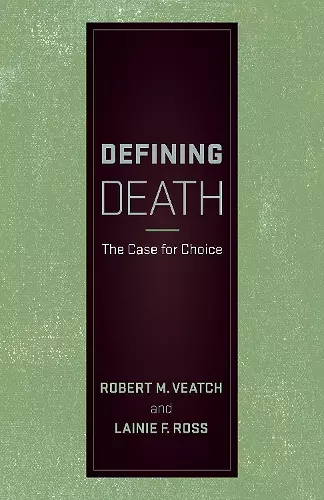Defining Death
The Case for Choice
Robert M Veatch author Lainie F Ross author
Format:Paperback
Publisher:Georgetown University Press
Published:3rd Nov '16
Currently unavailable, our supplier has not provided us a restock date
This paperback is available in another edition too:
- Hardback£144.00(9781626163546)

The authors, distinguished scholars of medical ethics, have proposed and defended a multiplex definition of death for death statutes. They argue that our liberal, pluralistic society should provide every citizen a personal choice in the definition of their death. Their provocative argument merits careful study by public policy experts. -- James Bernat, Louis and Ruth Frank Professor of Neuroscience, Dartmouth-Hitchcock Medical Center Veatch and Ross compellingly endorse a public policy that allows some room for individual choice in how death is declared. They base their endorsement on a thorough understanding and explication of the clinical, legal, social and philosophical issues in play. -- Stuart Youngner, Professor of Bioethics, Professor of Psychiatry, Case Western Reserve University Veatch and Ross take us on a journey to better understand what is significant to humans and what is at stake at the time of death. Readers will be fascinated by the evolution of the definition of death: from the well established heart-and lung-oriented concept to the still controversial whole-brain based definition and to the future hot topic concept of higher-brain death. By proposing individual choice among socially accepted definitions of death, the authors advocate for a fair, flexible approach to law and public policy in the pronouncement of death. -- Ali Bagheri, Assistant Professor of Medicine and Medical Ethics, School of Medicine, Tehran University of Medical Sciences This excellent and concise volume offers a definitive account of the contemporary definition-of-death debate. Veatch and Ross adeptly integrate the clinical, philosophical, ethical and policy issues to craft a compelling argument for widespread adoption of a conscience clause in the determination of death. -- Robert Olick, Associate Professor, Center for Bioethics and Humanities Veatch and Ross have provided a very readable and authoritative account of how medicine and society have struggled with the question of defining death in the era of organ transplantation. They offer a compelling approach to resolving this debate that deserves serious consideration by all with an interest in these critical issues. -- Robert Truog, Professor and Director, Center for Bioethics, Harvard Medical School
New technologies and medical treatments have complicated questions such as how to determine the moment when someone has died. The result is a failure to establish consensus on the definition of death and the criteria by which the moment of death is determined. This boo is suitable for professionals in medicine, law, insurance and more.New technologies and medical treatments have complicated questions such as how to determine the moment when someone has died. The result is a failure to establish consensus on the definition of death and the criteria by which the moment of death is determined. This creates confusion and disagreement not only among medical, legal, and insurance professionals but also within families faced with difficult decisions concerning their loved ones. Distinguished bioethicists Robert M. Veatch and Lainie F. Ross argue that the definition of death is not a scientific question but a social one rooted in religious, philosophical, or social beliefs. Drawing on history and recent court cases, the authors detail three potential definitions of death--the whole-brain concept; the circulatory, or somatic, concept; and the higher-brain concept. Because no one definition of death commands majority support, it creates a major public policy problem. The authors cede that society needs a default definition to proceed in certain cases, like those involving organ transplantation. But they also argue the decision-making process must give individuals the space to choose among plausible definitions of death according to personal beliefs. Taken in part from the authors' latest edition of their groundbreaking work on transplantation ethics, Defining Death is an indispensable guide for professionals in medicine, law, insurance, public policy, theology, and philosophy as well as lay people trying to decide when they want to be treated as dead.
- Commended for Catholic Press AssociationBook Award for Faith and Science 6 (United States)
- Commended for CPA Book Award for Faith and Science 6 (United States)
ISBN: 9781626163553
Dimensions: unknown
Weight: 227g
168 pages